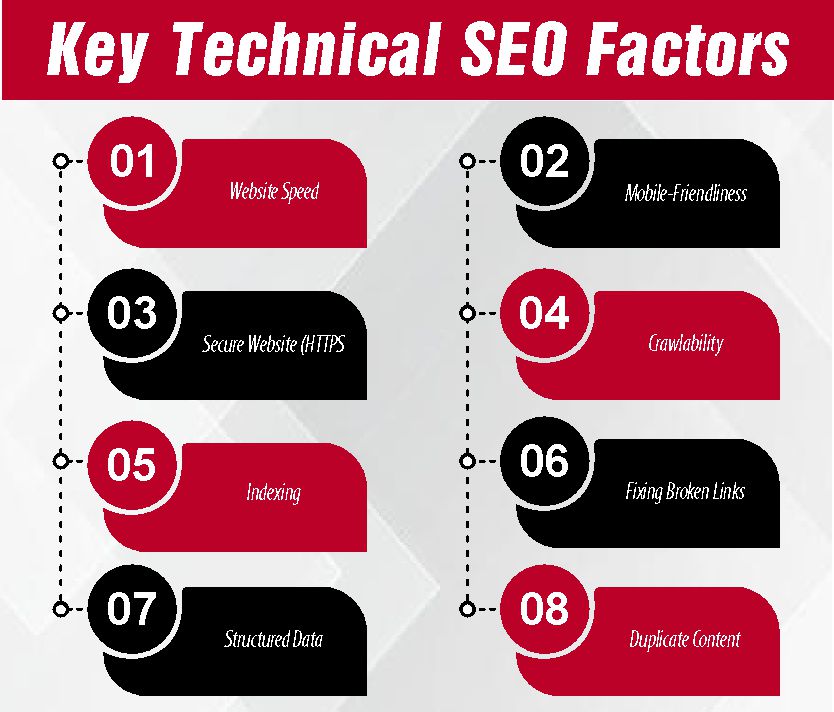You are aware of SEO, but ever ask yourself — what technical seo is and why it plays such a significant role in your business success?
Many entrepreneurs think that SEO begins and ends with keyword placement on web pages. They take the time to develop content, blog, or advertise, but their website cannot rank on the search engines. Reality is, without a proper technical setup — like fast page loading, mobile responsiveness, and proper indexing — Google might not be aware that your website exists. This means all your effort can go unnoticed.
That’s where Phoenix Dial steps in. We are a trusted technical seo agency with a team of skilled specialists who live and breathe technical on page seo. Our experts fix crawl errors, improve website speed, ensure secure HTTPS connections, and create a structure that search engines love. With years of experience delivering technical seo services to service-based businesses, we know exactly how to turn a struggling site into a high-performing one.
Table of Contents
ToggleIn this post, we’ll walk you through the basics of technical seo, explain why is technical seo important, and share the key technical seo factors you must focus on to build a strong online presence. By the end, you’ll understand how a few technical improvements can transform your search rankings.
Start Growing Your Business Today
Get a free, personalized quote via WhatsApp for your business. No pressure—just smart solutions tailored to your goals.
What is Technical SEO?
Technical SEO is the optimization of a website’s back end so that search engines can crawl, understand, and find it without any issues. It involves optimizing your site’s non-content elements, such as speed, mobile-friendliness, security, and structure.
It is similar to getting a store ready for opening day. You put the shelves in place, get the lighting repaired, and create room for people to move around. Technical seo places your site in order, it loads fast, and functions on any platform.
It also involves such activities as creating an XML sitemap, fixing dead links, setting up HTTPS for security reasons, and making sure there are no duplicate pages. These improvements allow search engines to properly read your site and rank it higher.
Without technical seo, even good content doesn’t appear in search results because search engines are unable to fetch or comprehend it well. This makes it a foundation for all other SEO efforts.
Benefits of Technical SEO
Technical seo makes your site rank higher by making it faster, safer, and more understandable for search engines. It increases the user experience through fast pages and fast-performing sites on all platforms. Increased security in the form of HTTPS makes your users trust your page. Technical seo also improves the mobile experience and makes you accessible to more people who browse through phones and tablets.
Higher search rankings
When your page loads quickly, is secure, and can be easily read by search engines, it will rank better in the search engines. Technical seo fixes problems that could stop Google from ranking your pages, helping you reach more potential visitors.
Better user experience
An optimally optimized website is fast, user-friendly, and functions correctly. Users can easily locate what they are looking for, therefore stay on your website longer and decrease bounce rates. This is an important part of technical on page seo.
Increased website security
Utilizing HTTPS and keeping your site up to date protects user data and builds confidence. Search engines prefer secure sites, so making sure that your site is secure is a win for your users as well as your search rankings.
Improved mobile experience
More individuals surf on mobile devices than ever. Technical seo assists your site in functioning properly and appearing well on tablets and phones. This will make it easier to draw and retain more mobile surfers, which is yet another search engine ranking factor.
Importance of Technical SEO
Establishes a strong foundation for the rest of SEO activities
Good technical seo ensures that the structure, speed, and security of your site are done first before concerning yourself with content or backlinks. Without this foundation, other SEO efforts might fail.
Helps search engines better comprehend your content
With good technical seo, it won’t be a problem for search engines to crawl and index your website. This implies that your pages will rank better for the correct searches.
Avoids ranking problems due to technical flaws
Repairing broken links, duplicate pages, and slow loading speeds keeps your site healthy. These technical repairs keep you from experiencing surprise ranking drops for having on-page errors search engines deem objectionable.
Why is Technical SEO Important?
Ensures Search Engines Can Access Your Site
Technical seo assists the search engines in crawling and indexing your pages properly. If your website contains broken links, poor page structure, or hidden pages, the search engines will not make them accessible in search results. Therefore, your audience will never locate your content, even if it is of value.
Improves Website Performance
A slow or poorly optimized website drives visitors away. With faster site speed, error correction, and easy navigation, technical seo provides an excellent user experience. The longer your users stay, the more it tells search engines your site is well-ranking-worthy.
Supports Mobile Users
With increasing numbers of people browsing the web using phones, mobile optimization is essential. Technical seo makes sure that your site adapts to any screen and runs well on phones, which is also a search engine ranking signal nowadays.
Builds Trust with Security
With website etiquette and HTTPS, your visitors’ information is secure. A secure website not only persuades people, it also receives advantages from search ranking.

Key Technical SEO Factors
Technical seo consists of the components that ensure your website is fast, secure, and search engine friendly. Website speed, mobile-friendliness, and HTTPS security are all essential components. Crawlability and indexing assist in ensuring that the search engines can crawl and index your content. Repairing broken links, using structured data, and preventing duplicate content all improve rankings and usability.
Website Speed
A quick-loading site prevents visitors from departing and enhances search rankings. Slow sites annoy visitors and lower your search rank. Optimization of images, caching, and reduction of unnecessary code are easy methods to make them go faster.
Mobile-Friendliness
Since most of your visitors will be visiting from phones, your site has to be available in all screen resolutions. Your user experience is enhanced with a mobile-optimised design and also complies with Google’s mobile-first indexing rules.
Secure Website (HTTPS)
HTTPS safeguards your users and guarantees them your site is safe. Search engines also rank secure websites over non-secure ones.
Crawlability
Search engines spider through your website in order to gather content. Clean site architecture, functional links, and correct robots.txt file assist in making your website spiderable.
Indexing
Indexing is the process through which search engines archive your web pages into their system in order to show them within the search results. Sitemap submission and avoiding blocking pages assist the correct content in being indexed.
Fixing Broken Links
Broken links are bad for user experience and make your site appear shady. Test for broken links on a regular basis and repair them to keep your site trustworthy and search engine-friendly.
Structured Data
Structured data or schema markup makes search engines more intelligent about your content. It also has the power to enhance your site’s appearance in search engine listings with rich snippets.
Duplicate Content
Having identical content on multiple pages is confusing for search engines and decreases rankings. Employ unique content on every page and correct canonical tags to prevent duplication problems.
Common Technical SEO Mistakes to Avoid
Slow site speed, bad mobile optimization, and HTTPS security absence can hurt rankings as well as user trust. Crawl issues, broken link errors, and duplicate content also hinder technical seo performance and need to be handled immediately.
Slow Website Speed
A slow loading site will get your visitors crazy and make them leave without viewing your content. Search engines favor quicker sites more, too, so neglecting optimization for speed will damage your visibility.
Ignoring Mobile Optimization
As the majority of users are viewing the site from mobiles, a non-mobile friendly website can lose a high percentage of potential visitors. Mobile friendliness also contributes to search engine rank.
Skipping HTTPS Security
Inability to use HTTPS may render your site insecure for guests. It has an impact on search ranking as well because secure sites are favored by search engines.
Crawl Errors and Missing Sitemaps
If search engines are unable to crawl your site effectively because of errors or a lack of XML sitemaps, your content will not appear in search results.
Broken Links
Links that lead to error pages damage user experience and reduce your site’s credibility. Regular link checks help keep your site healthy.
Duplicate Content
Having duplicate or nearly duplicate content on multiple websites confuses search engines and lowers your ranking. All the pages must include unique, high-quality content to prevent this impact.
Basic Technical SEO Checklist for Beginners
Begin with optimizing website speed, activating HTTPS, and optimizing the site for mobile. Develop an XML sitemap, resolve broken links, and provide quality crawlability. Include structured data and prevent duplicate content to make your technical seo bulletproof.
- Test Website Speed – Utilize tools such as Google PageSpeed Insights to analyze and make page loads more optimal.
- Enable HTTPS Security – Install an SSL certificate to secure your website and establish trust.
- Make It Mobile-Friendly – Make sure your website functions correctly for every screen resolution.
- Create an XML Sitemap – Submit it to search engines to improve indexing.
- Fix Broken Links – Search and correct any links that point to error pages.
- Optimize Crawlability – Employ a clearly defined site structure and proper robots.txt file.
- Add Structured Data – Enable search engines to comprehend your content
- Avoid Duplicate Content – Make each page distinct with useful information.
Conclusion
A solid technical SEO foundation is the building block of a successful site. It makes your site load faster, remain secure, and function optimally for users and search engines. Done correctly, it enhances user experience, enhances rankings, increases organic traffic, and drives conversions. The outcome—more exposure, more credibility, and sustainable growth—is the reason why it is a requirement for any online venture.
Begin with improving slow-loading pages, deleting broken links, improving mobile responsiveness, and securing your website. With these fundamentals done, you can add more advanced optimizations such as structured data, crawling efficiency optimization, and ongoing performance monitoring to put yourself at an advantage compared to others.
If you’d like your website to run at its optimal level, we can assist. Phoenix Dial can design fast, secure, and SEO-friendly websites designed to build your business. Give us a call today and let’s get your website working harder for you.
FAQ’s
What is technical SEO?
Technical SEO is the process of optimizing your website’s backend elements—like speed, security, and structure—so search engines can crawl and index it easily.
Why is technical SEO important?
It improves user experience, boosts search rankings, and ensures your site works well for both visitors and search engines.
How does technical SEO affect rankings?
Search engines favor fast, secure, and mobile-friendly websites. Good technical SEO helps your pages rank higher in search results.
Can I do technical SEO myself?
Basic fixes like improving page speed and mobile design can be done yourself, but advanced tasks may require expert help.
How often should I check technical SEO?
It’s best to run a technical SEO audit every few months to catch issues early and keep your site running at peak performance.

